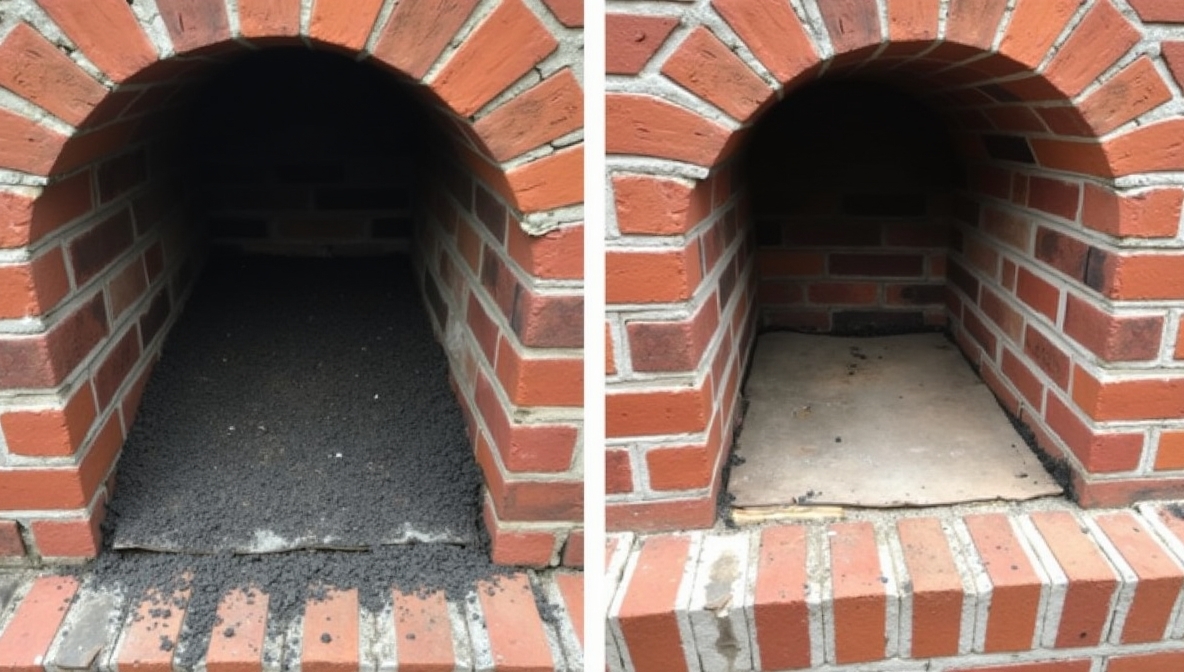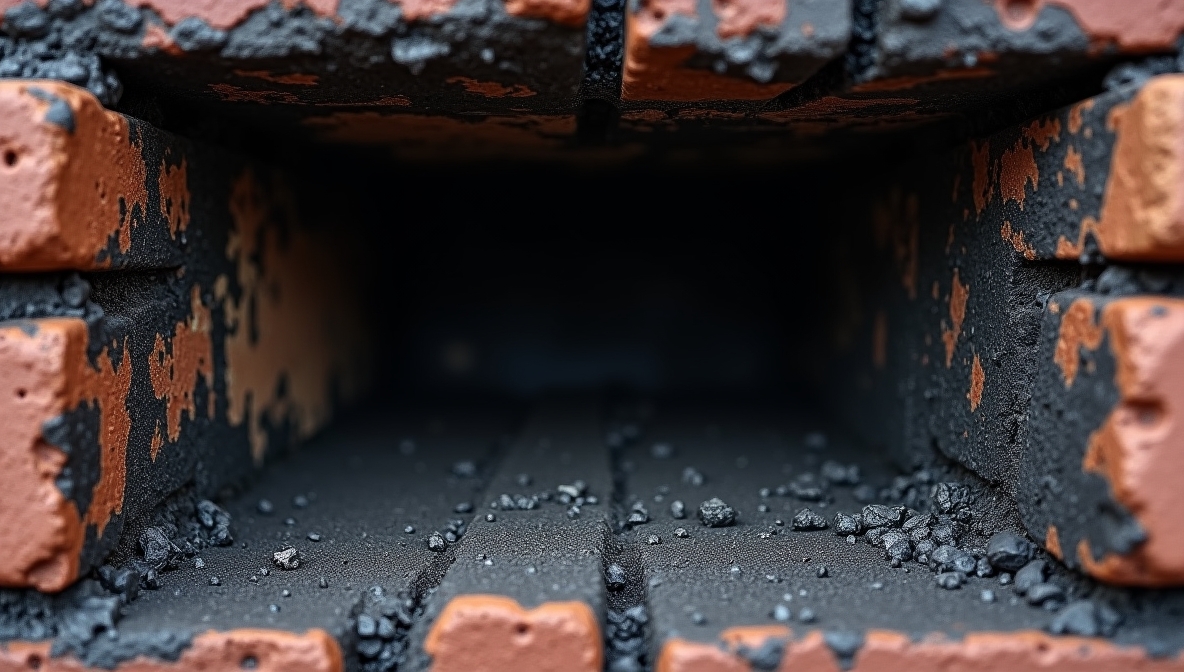The Role of Chimney Cleaning
A chimney sweep does much more than just make a mess. If you’re wondering how long does it take to sweep a chimney, a professional cleaning is a deep and thorough process that removes all the byproducts of burning wood.
- What a chimney sweep actually removes: A sweep will remove soot, which is a fine, powdery residue. They will also remove creosote, which is a much more dangerous substance. They also get rid of any debris, like leaves, and they will remove any blockages from birds' nests or other animals.
- How a clean chimney supports safety and efficiency: A clean chimney is a safe chimney. It allows smoke, gases, and other particles to vent properly. This not only keeps your home safe from fire but also ensures that your fireplace is working as efficiently as possible. A clean chimney has a good draft, which means a better fire and less wasted energy.
Cleaning is Imperative to Health and Safety
Your chimney is the lungs of your home's heating system. If they are clogged, your home can't breathe properly.
Dangers of Not Cleaning Your Chimney
So, let's get right to the point: What Happens if you don't Clean Your Chimney? A lot of bad things can happen, and they are all very serious.
- A. Safety Concerns: The biggest risk of an unclean chimney is fire. A chimney fire can spread to the rest of your home, and it can happen much faster than you might think. A professional cleaning is the single best way to prevent this.
- B. Creosote Buildup: Creosote is the main culprit in most chimney fires. When wood burns, it releases a black, sticky residue that sticks to the inside of your chimney flue. Over time, it can build up into a hard, shiny, and highly flammable substance. It is a very serious fire hazard.
- C. Chimney Fires: A chimney fire starts when a buildup of creosote ignites. The fire can burn at over 2,000 degrees Fahrenheit, which is hot enough to damage the chimney structure itself and spread to the rest of the house. According to the Chimney Safety Institute of America (CSIA), there are over 20,000 residential chimney fires every year in the United States, causing millions of dollars in damage.
- D. Poor Air Quality & Health Hazards: A chimney that is blocked with creosote or a nest cannot vent properly. This can cause smoke and harmful gases to back up into your home. The most dangerous of these is carbon monoxide (CO), which is a colorless, odorless gas that can be deadly. In a well-sealed New England home, like many in Massachusetts, this is a particular danger, as a poor draft can cause a negative pressure in the house, pulling the smoke and carbon monoxide back in.
- E. Structural Damage to the Chimney: A lack of cleaning can cause a lot of structural damage to your chimney. The buildup of creosote can cause the flue liner to crack and fall apart. The constant exposure to smoke and soot can also cause the mortar to weaken and the bricks to become brittle. This kind of damage is often very expensive to repair and is usually not covered by home insurance.
- F. Animal & Debris Blockages: A chimney can be an attractive home for all sorts of animals. Birds, squirrels, and raccoons will often build nests in a chimney, especially if there is no cap. These nests are a major blockage and a serious fire hazard. They can also cause a lot of damage to the chimney itself.

Weekly newsletter
No spam. Just the latest releases and tips, interesting articles, and exclusive interviews in your inbox every week.
What Can You Do
The good news is that these problems can be easily avoided with a little bit of knowledge and some regular care.
Signs Your Chimney Needs Cleaning
Your chimney will often give you clues when it's in need of attention. Knowing what to look for can help you catch a problem early before it becomes a bigger, more expensive issue.
- Strong smoke odor indoors: If you can smell a strong, campfire-like odor in the room, especially on a humid day, it means that creosote is trapped inside your chimney.
- Excessive soot buildup around fireplace: If you see a lot of black soot or creosote flakes around your fireplace, it's a sign that your chimney is not venting properly.
- Slow or weak draft (smoke not venting properly): A chimney needs a good draft to pull in oxygen. If your chimney is clogged with creosote or a blockage, it will be hard to get a fire started and keep it burning.
- Oily black stains inside fireplace or chimney: If you shine a flashlight up the flue and see a shiny, black glaze on the chimney walls, you have glazed creosote, which is a serious fire hazard.
How Often Should You Clean Your Chimney?
TheChimney Safety Institute of America (CSIA) recommends that chimneys be inspected and cleaned at least once a year. However, if you use your fireplace often, or if you burn a lot of wet, unseasoned wood, you may need a cleaning more often.
The Best Time to Clean a Chimney
The best time to clean your chimney is in the spring or summer, after you are done using it for the season. This gives you plenty of time to get any needed repairs done before the next heating season starts.
Professional vs. DIY Chimney Cleaning
While you can buy a chimney cleaning kit at a hardware store, it is not recommended that you clean your chimney yourself. A professional has the right tools, knowledge, and experience to do the job safely and correctly. They will not only clean your chimney, but they will also perform a full inspection, looking for cracks, leaks, and other damage. For expert care of all your chimney and fireplace systems, from traditional fireplaces to modern kitchen range hoods, including how to service a kitchen chimney, a professional is key. The experienced team at Dave's Chimney Service provides honest evaluations and transparent recommendations, ensuring you get the best solution for your home's safety and air quality.
Final Thoughts
This brings us back to the central question: What Happens if you don'tClean Your Chimney? The answer is that you are risking a chimney fire, dangerous carbon monoxide poisoning, and expensive repairs. An unclean chimney is a fire hazard, a health risk, and a source of poor air quality in your home. It's a risk that is not worth taking.
In the end, you should now have a clear answer to What Happens if you don't Clean Your Chimney? The dangers are very real and can be very serious. A regular, professional cleaning is a small price to pay for the safety of your home and family.











.png)
.png)